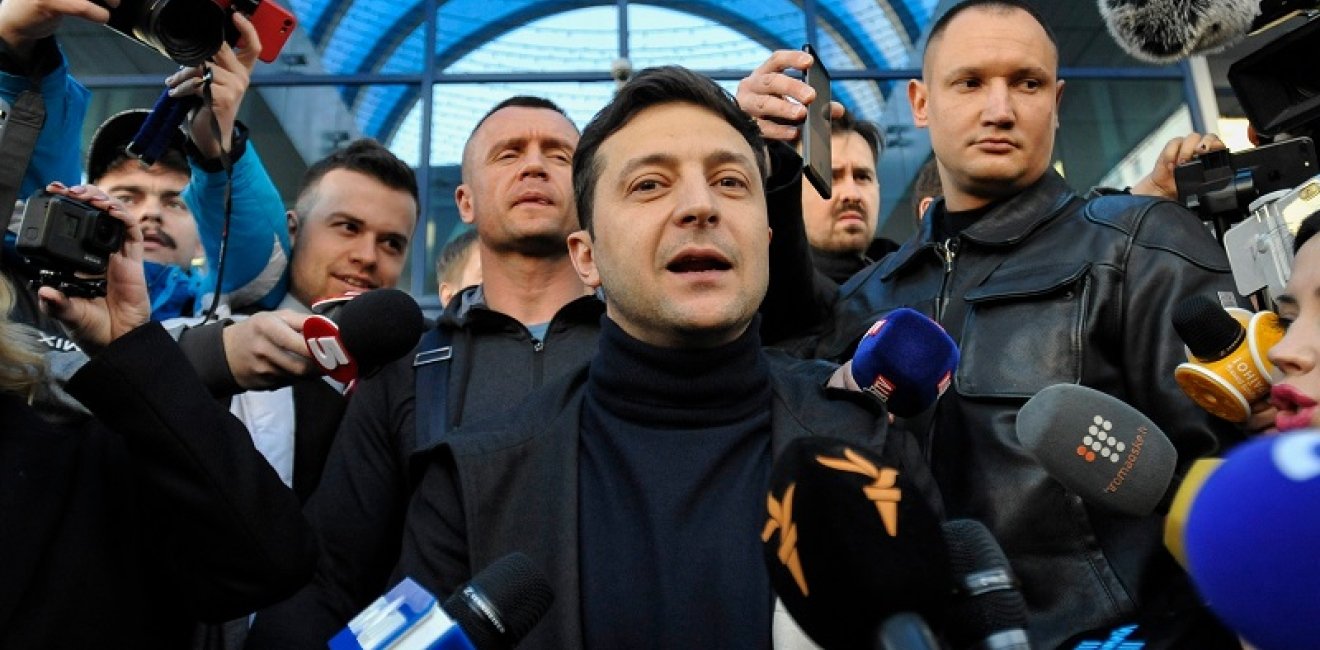
A blog of the Kennan Institute
BY ANDRIAN PROKIP
Volodymyr Zelenskiy received an unprecedented level of support during Ukraine’s presidential elections. Nothing like it has ever before been seen in the country. But preserving his popularity will be much more difficult than gaining the ballot box win, and he will have to go from zero to sixty to satisfy voters’ expectations the moment his May 20 inauguration is over.
According to the final election results, verified by the Central Election Commission of Ukraine, Zelenskiy received 73.22 percent of votes on the second round to Petro Poroshenko’s 24.45 percent. Zelenskiy won in all regions of the country except Lviv oblast, where Poroshenko took 62.79 percent of the votes.
Voters had a couple of reasons to vote for Poroshenko rather than Zelenskiy. Some simply rejected Zelenskiy outright as a serious contender because of his lack of experience in both domestic politics and international affairs, which they felt would make him an easy walkover for Russia’s president Vladimir Putin. Additionally, some of his speeches suggested Zelenskiy could turn out to be a pro-Russia president—not what the country needs while in an undeclared war with Russia.
Others believed Poroshenko really had done a lot in his five years as president to stabilize the country, despite the annexation of Crimea and the start of the war in the Donbas. They pointed to the macrofinancial stability achieved in 2018, when Ukraine enjoyed the lowest inflation rate and highest GDP growth since 2014, and stability of the national currency. However, Poroshenko admitted to making mistakes during his presidency with respect to labor policies and communicating with the public.
More interesting, because they will define the expectations of and support for the incoming president during his term in office, were the reasons why peopled voted for Zelenskiy. Disappointed expectations are likely to make themselves felt quickly: Ukraine is a country with a long-established tradition of massive strikes and protests. Anyone running the country needs to be especially sensitive to the public’s moods and demands, and public sentiment is what Zelenskiy and his advisers tapped into.
Here the electorate showed a certain inconsistency. On the one hand, voters demonstrated fatigue with professional politicians, in line with what is shaping up as a global tendency. On the other hand, people expect some resolution to the country’s problems, a very high charge for a novice politician. The question is whether Zelenskiy can succeed in meeting the electorate’s expectations.
A few days before the second round of elections, the Kyiv International Institute of Sociology, or KIIS, published the results of a poll on what people expected from the president during his first 100 days in office. The top three expectations were:
- a decrease in tariffs for utilities, expected by 39.1 percent of respondents;
- a bill to cancel the immunity of members of parliament, the president, and judges, expected by 35.5 percent of respondents; and
- starting or speeding up investigations into the most prominent corruption crimes, expected by 32.4 percent of respondents.
The electorate’s expectations, as these results suggest, were fueled by the popular sitcom Servant of the People, in which Zelenskiy played a president arising from the common people and exhibiting integrity and a strong moral compass while in office. Even if Zelenskiy the candidate did not promise specific things—and his campaign was quite nonspecific—the idealized and unquestionably simplistic portrayal of a president on the TV series allowed voters to develop their own expectations of the actor-turned-presidential candidate. Another factor driving the high level of expectations was Zelenskiy’s election ads, which again capitalized on his role in the TV series in promising to expose corruption and jail the guilty.
Now the incoming president and his team must deal with the expectations they ginned up. One thing is absolutely clear: it will be impossible to satisfy the expectations identified in the KIIS poll during the first 100 days of Zelenskiy’s presidency. Another insight the poll results brought to light is that people do not understand the responsibilities of the president.
The main spheres of presidential responsibility in Ukraine are security, defense, and foreign affairs. The domestic concerns revealed in the KIIS poll point to an extremely high risk that Zelenskiy will lose popularity quickly during the next few months and will need to work on internal affairs and achieve some demonstrable results in that arena. It is telling that immediately after the elections, Zelenskiy’s advisers began tamping down public expectations by pointing out in media interviews that the president was not personally responsible for decreasing tariffs or jailing criminals, including those involved in corruption.
The business world’s expectations of the new president are much more pragmatic. The European Business Association announced seven steps it hoped to see the administration take during the upcoming months. Among those are the appointment of a new general prosecutor and a new head of the state security service, the rebooting of anticorruption agencies, vigorous support for the country’s macroeconomic stability by continuing cooperation with the IMF and protecting the independence of the National Bank of Ukraine, and advancing the program of reforms in the country. According to a poll conducted by the association, foreign investors expect the new president to demonstrate effective anticorruption efforts, appoint credible reformers to key positions, and separate politics from business interests by reducing the influence of oligarchs.
In general, the high level of support Zelenskiy received in the elections was the result of too many and too different expectations people have of him. It will not be possible to satisfy all such expectations, especially in the short term, in light of the administration’s limited resources and legal authority. To avoid seeing his high level of support degrade to a similarly high level of disappointment, Zelenskiy will need to have advocates in parliament and the government, and that means pro-administration candidates will need to win in the parliamentary elections scheduled for late October. The question hovering in observers’ minds is whether, in the swiftly changing environment of public sentiment in Ukraine, Zelenskiy will be able to hold on to his popularity until then.
Author

Director, Energy Program, Ukrainian Institute for the Future

Kennan Institute
After more than 50 years as a vital part of the Wilson Center legacy, the Kennan Institute has become an independent think tank. You can find the current website for the Kennan Institute at kennaninstitute.org. Please look for future announcements about partnership activities between the Wilson Center and the Kennan Institute at Wilson Center Press Room. The Kennan Institute is the premier US center for advanced research on Eurasia and the oldest and largest regional program at the Woodrow Wilson International Center for Scholars. The Kennan Institute is committed to improving American understanding of Russia, Ukraine, Central Asia, the South Caucasus, and the surrounding region through research and exchange. Read more

Explore More in Focus Ukraine
Browse Focus Ukraine
Talking to the Dead to Heal the Living

Ukrainian Issue in Polish Elections


